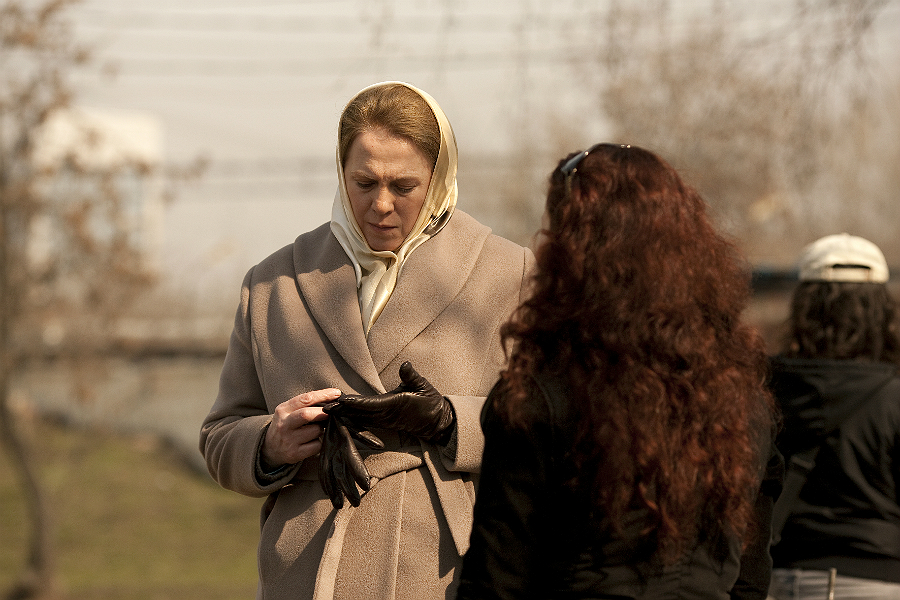Discover Tuesdays – Elena

DW Mault on Elena, at once a lament and a thesis on modern day Russia and beyond…
The past is a foreign country, and our relations with the past brings with it elements of what it’s like to commit to alien visitation rights; and this is why we strive to seek explanations within the unknown. Culture, and every element of the importance to our very existence, is the reason why we must seek the meaningful in an ever more meaningless world. We need to bypass the idea that cinema not in the English language is something to be endured for our better spiritual growth (kinda like Reithian ideas of what is culturally good for the people who know no better); it is in fact beautifully enigmatic and holds up an unknown vision for the ever curious to show how we live now.
Elena has been a longtime coming… It premiered in the Un Certain Regard sidebar at the 2011 Cannes Film Festival (and it was awarded the Prix Spécial du Jury) and it now arrives in Liverpool to be screened as part of FACT’s Discover Tuesdays. It’s the latest film from Andrey Zvyagintsev (following on from his Venice Golden Lion winning debut, The Return, and his subsequent film, The Banishment), and shows us a filmmaker full of disgust for modern Mother Russia, but in very much subtle increments; very much so it creeps up and slowly overtakes you with an underscored breathtaking power.
Nadezhda Markina is the eponymous Elena; an ex-nurse who married her rich businessman patient, Vladimir. They now live in a cavernous apartment in central Moscow, at first their living arrangements appear strange to say the least. They have separate bedrooms and watch different television programmes, which very slowly explains to you the differences in class between these two individuals and makes us question whether they are housekeeper and gentleman or man and wife? One could say their relationship harks back to a morganatic marriage nearly a century after the October Revolution. Into these everyday travails are forced their retrospective children from previous marriages: Elena’s wastrel son Sergey and his family, and Vladimir’s self destructive, fiercely independent daughter Katerina.
Elena is a film that calls to mind a glacial puzzle; a puzzle of where we are now, where we are going and how the past is never really past (especially in such an historically specific country like Russia). The film has a stillness and use of negative space that recalls nothing so much of those moments inbetween action and reaction. We open and close on the partial observation of stillness as life, and life as stillness. In fact, one of the intelligent pleasures of Elena is how Zvyagintsev doubles everything; what we see is constantly juxtaposed against its opposite, he makes points in a way that seems to have the potential for codified dog whistles only.
Of course, in a country that in the last 150 years has seen so much change, a Russian artist will always have to address duelling monoliths of power/wealth and class; and what that means in today’s meta-capitalistic, post-communistic nightmare that is Russia – the country that gave the world oligarchs and Dostoyevsky. Elena highlights the difference in the worlds of Elena and Vladimir; from the exclusive apartment in downtown Moscow and the crumbling khrushchevka in Moscow’s industrial suburb where Sergey and his family reside.
The first half slowly builds in an effect of repetition and observation that rivals Chantal Akerman’s masterpiece Jeanne Dielman, 23 quai du Commerce, 1080 Bruxelles, and makes us think we may be about to see an easy representation of the decisions the financially impoverished must make for security. But no, the film is better than that; we gradually come to a point where we start thinking about James M Cain’s The Postman Always Rings Twice (adapted by various directors from Visconti to Garnett to Rafelson); so it’s a thriller that is not interested in ideas of genre or the banalities of plot. What it is interested in is guilt, power and the non idea of a civilised civilisation.
At this halfway point we have a beautiful, emotionally violent scene that takes place in a private hospital where Vladimir is recovering from a heart attack and is visited by his estranged daughter. This scene is one that could only have been written in Russia; we observe a feisty conversation between an independent daughter and her father that takes in ideas that stretch from existence, cursed genes, the soul and what it means to be alive with self loathing… As I said only in Russia. Plus it’s the longest and most verbose scene in a film with hardly any dialogue. Why would you need dialogue when a true soldier of cinema can tell everything while (literally) saying nothing?
Elena doesn’t say anything, it shows us and asks you to look past what is in front of you. As in every one of these ideas we have to see, to strive, and to admit that we are watching a failing society that is close to breakdown; a place where people drift away from each other all the way, allowing previous generations of ruling class societal experiments to dictate how our environment will condition us for whatever our roles are to be.
These ideas Zvyagintsev is warning us are too little too late to be aware of, as if the meek inherit the world. It’s all too late after all, what are they to do? Replace a library with a flat screen television to anaesthetise ourselves from the violent world ruled by ingratitude and the absence of justice? In this quasi-feudal social environment, avarice and blood ties trump all, and that’s what we’re left with: a horrible hopeless howl of despair that makes no sound.
DW Mault
Elena screens today (29th January) 6.10pm @ FACT as part of Discover Tuesdays





